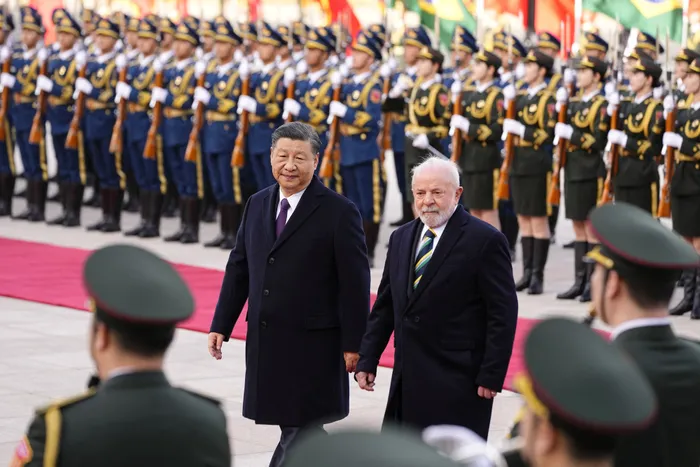Lula’s China visit boost for BRICS, South-South relations

Picture: Ken Ishii/Pool via REUTERS – Chinese President Xi Jinping, left, welcomes Brazil’s President Luiz Inácio Lula da Silva in a ceremony at the Great Hall of the People in Beijing on Friday.
By Ashraf Patel
President Luiz Inácio Lula da Silva’s visit to China this week is a signal that both Brazil and China seek to play a significant role in a post-Covid fractured world, which is rife with conflict, supply chain constraints, climate change challenges and war.
Since the re-election of Lula in November, he has been a resurgent global figure in the regional and international arenas. He has committed to “put Brazil back on the world stage” after the nationalist, chaotic years of the Bolsonaro era. In doing so, Lula has had a busy international schedule.
Brazil under Lula is also committed to a “more fair and balanced world order”, solid south-south co-operation and BRICS (the bloc formed by Brazil, Russia, India, China and South Africa). China is already Brazil’s largest trading partner and Lula hopes to diversify and expand those trade flows.
Several agreements will be signed this week. His delegation reportedly includes more than 200 major business leaders, including the billionaire owners of the meat processing giant JBS, half a dozen ministers, three state governors and dozens of legislators, among them the senate president, Rodrigo Pacheco.
Lula is being received by Xi and his close ally, Li Qiang, the former Communist Party chief of Shanghai who was recently named China’s new premier. Before the visit, China’s Foreign Ministry said that as leaders of “major developing countries”, Xi and Lula would “bring our comprehensive strategic partnership to a new height and make new contributions to regional and global stability and prosperity”.
China’s exports surged last month as the world’s second-largest economy continued to rebound from Beijing’s harsh “zero-Covid” pandemic policies. Total exports soared 14.8 percent year on year, customs data showed on Thursday, the first rise in six months and a sharp rise from March last year when lockdowns crippled the economy.
Imports fell a smaller-than-expected 1.4 percent. “I will invite (Chinese President) Xi Jinping to Brazil for a bilateral meeting to show him projects for which we want to attract Chinese investment,” Lula said, without elaborating on when Xi’s visit would take place.
Lula’s visit to China is part of the new Brazilian government’s efforts towards re-establishing international relations, which also include recent trips to Argentina – where the Celac meeting took place – Uruguay and the US, as well as meetings with European leaders who came to the president’s inauguration in January.
This is also Lula’s first trip outside the Western Hemisphere during his third term in office. The Brazilian delegation to China began on Thursday morning in Shanghai. Lula participated in former Brazilian president Dilma Rousseff’s inauguration as head of BRICS’ New Development Bank (NDB).
This is particularly significant as her experience as former president of Brazil, chief of staff under Lula, and chairperson of Petrobras is important. She understands foreign relations administration as well as governance of company boards, among others, which is crucial for the bank.
The NDB is expanding, with new countries joining to contribute equity as well as to receive loans. Key priorities would be infrastructure development and climate change adaptation mechanism, as well as the Contingency Reserve Arrangement model.
Among the business leaders accompanying Lula are those from the agriculture industry. Brazil’s exports to China are crucial to its economy, and Lula seeks to balance this through diversity and technology plans.
Lula is also committed to retaining “good trade relations” with key partners, the US and EU and China. His key priorities are to address inequality in global South; finance for development; climate change mitigation and the preservation of the Amazon, for which substantive funds promised by the North have not been forthcoming.
Bilateral trade between China and Brazil totalled $150bn (about R2.7trillion) last year – an increase of 10.1 percent compared with the previous year, Global Market Intelligence analysts Ailsa Rosales and Alejandro Duran Carrete wrote in a briefing note on April 6.
Brazil mainly exports iron ore, soybeans and crude petroleum to China, while semiconductor devices account for the largest share of Chinese exports to the Brazilian market, according to data compiled by the Observatory of Economic Complexity.
Lula’s and Xi’s foreign policies have greatly converged in the past three months in a complex, fractured world. Their joint global-regional priorities are now firmly rooted in a global engagement with multilateral institutions and power centres, with a view of promoting an equitable and peaceful global order.
In this regard, Lula said he also planned to suggest mediating peace talks between Russia and Ukraine during his meeting with Xi. Among Western leaders, the proposal has only been welcomed by French President Emmanuel Macron so far.
In terms of the global developmental domain, both Lula and Xi have committed themselves to a new Global Development Initiative, as well as a new Global hunger accord aimed at addressing the current world hunger crisis.
This visit and its outcomes also bode well for Africa and its efforts at rebuilding its economies, which are currently facing a new debt crisis, and weaker than expected post-Covid growth prospects. This comes as the International Monetary Fund has forecast that South Africa’s GDP growth will be a paltry 0.2 percent, as its annual investment summits have failed to attract the relevant foreign direct investment needed for growth.
These initiatives by the “giants of the global South” are cementing the role of Lula and Xi as committed leaders of the fair world – rooted in the traditions of multilateralism, equitable development, peace and common prosperity for all.
Ashraf Patel is Senior Research Associate at the Institute of Global Dialogue